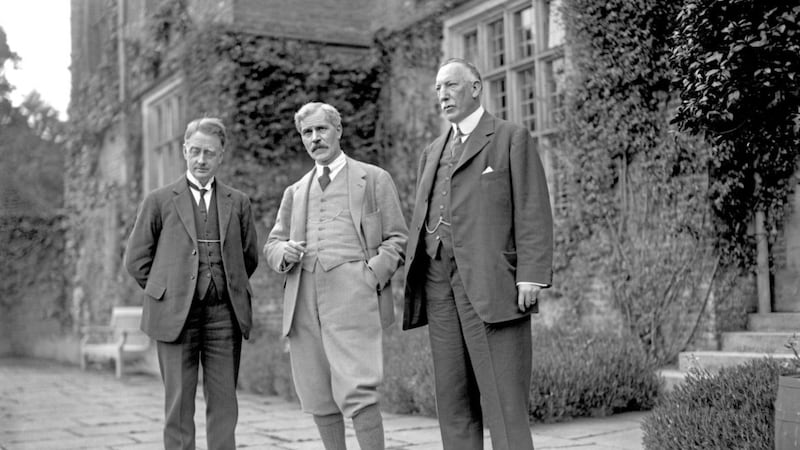BEFORE the Stormont talks had even begun, the parties here reached agreement last week on a language issue.
No, not the Irish language - this agreement was on how to speak fluent nothingness.
You never heard of it? Well, here is an example. "Unsettling," said the DUP.
"Extremely unsettling," added Alliance.
Since "unsettling" had been used twice, Sinn Féin said it was "hugely concerning".
The UUP rowed in behind, calling it "a matter of considerable concern".
The SDLP probably said something, but I cannot find it.
Those were our five main political parties speaking nothingness with remarkable political eloquence.
And what, you ask, were they saying nothing about? They were commenting on Bombardier's decision to sell its Belfast plant.
Bombardier employs 3,600 people and Manufacturing NI estimates the sale will directly impact on 12,000 jobs in the local economy.
Between the five parties and their 90 MLAs who are being paid to do nothing, no-one offered a solution, a proposal or even a suggestion about managing the risk of significant job losses.
The reason they said nothing was not just that all of them lack an economic policy.
They saw no need to offer a solution, because unlike most countries, our politics are not based on normal left-versus-right politics about the role of the state in the economy. (We base our politics on pieces of coloured cloth on a stick and call them "flegs".)
The USA, for example, has little state ownership. The private sector effectively runs society, including the health service.
The richest three people (Bill Gates, Warren Buffett and Jeff Bezos) own more than the lowest 50 per cent of the population. So three people have more money than 160 million people put together.
Mrs Thatcher transformed Britain into a similar society by privatising all major state-owned services and industries.
So when the Unite trade union recently called for Bombardier to be nationalised, our political parties said nothing, because they support Mrs Thatcher's belief that the state should not interfere in business.
Otherwise they would have said something useful.
Their view is perfectly rational. What is less rational is that there is no significant alternative view here to allow a normal political debate.
In the absence of a middle ground on constitutional issues, that debate would form a sectarian-free zone to inch us towards political normality.
Don't worry, you say, there will be a buyer for Bombardier.
That depends on whether the sale will include the intellectual property rights (a copyright system for inventions) to its manufacturing processes, or whether they will be retained by Bombardier.
If the IP rights remain in Belfast, the sale will be attractive. If not, the plant may be bought and sold off in parts.
Anyway, you say, nationalising Bombardier would mean the taxpayer subsidising jobs, which is wrong.
Is it? We already subsidise 38,000 farmers here with £350 million annually to produce nothing.
They merely have to maintain their land. So why protect rural jobs and not urban jobs?
When the banks collapsed the government nationalised them. Today, for example, the Royal Bank of Scotland (of which Ulster Bank is a part) is 62 per cent owned by the state, because capitalism failed.
Pope Francis has condemned capitalism as the "dung of the devil", but sadly, none of the Irish bishops appear to share his belief.
They tend to speak fluent nothingness too.
When the Troubles began in 1969, in what was a welfare society, Bombardier (then Short Bros) was largely owned by the state.
Mrs Thatcher sold it to Bombardier, while she was selling off council houses, electricity, airports, telephones, ports and shipbuilding.
When the Troubles ended, we were in a massively unequal Thatcherite society. No party pointed this out and none asked what type of society we might build - unbridled capitalism, socialism or any one of the varieties in between.
As it happened, the five main parties delivered unbridled capitalism, the demise of the welfare state and growing poverty and deprivation.
So if we want a new start here, why not expand the five areas of discussion among the parties in Stormont this week to include a sixth: the role of the state in society?
Less than a mile away from the talks, 3,600 jobs are on the line. If they are not worth talking about, nothing is.
As long as the talks are based on the sectarian electoral interests of the parties and not on the needs of the people, there will be no change here.
Which is why the five main parties, which are apparently so divided, remain united in speaking fluent nothingness. Expect to hear a lot more of it.









